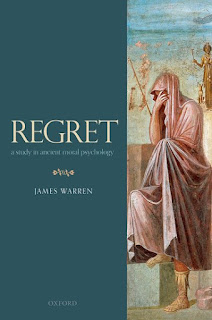 Fellow at Magdalene College, in 2001 he took up a Lectureship at the Faculty of Classics in Cambridge and a Fellowship in Philosophy at Corpus Christi college. He became Professor of Ancient Philosophy in 2017.
Fellow at Magdalene College, in 2001 he took up a Lectureship at the Faculty of Classics in Cambridge and a Fellowship in Philosophy at Corpus Christi college. He became Professor of Ancient Philosophy in 2017.
Warren applied the “Page 99 Test” to his new book, Regret: A Study in Ancient Moral Psychology, and reported the following:
Page 99 is at the beginning of my chapter on Aristotle's account of the relationship between regret and 'akrasia': the character-trait of those people who often act according to their non-rational appetites against the recommendations of their reason. It begins to outline the connection between Aristotle's account and Plato's related discussion in the Republic and cites Aristotle's Eudemian Ethics 2.8 1224b19-21 which shows how Aristotle recognises that the akratic person both takes pleasure in acting akratically and also is pained in anticipation of the regret to come.Follow James Warren on Twitter.
Page 99 gives a good indication of the general topic and methods used in the book.
Later chapters build on these foundations to give a general account of the ways in which Plato, Aristotle, and other ancient philosophers understand regret (metameleia in Greek) as a pain caused by the retrospective re-evaluation of an action originally performed in a condition of ignorance and how this connects their general accounts of practical knowledge and virtue.
--Marshal Zeringue



